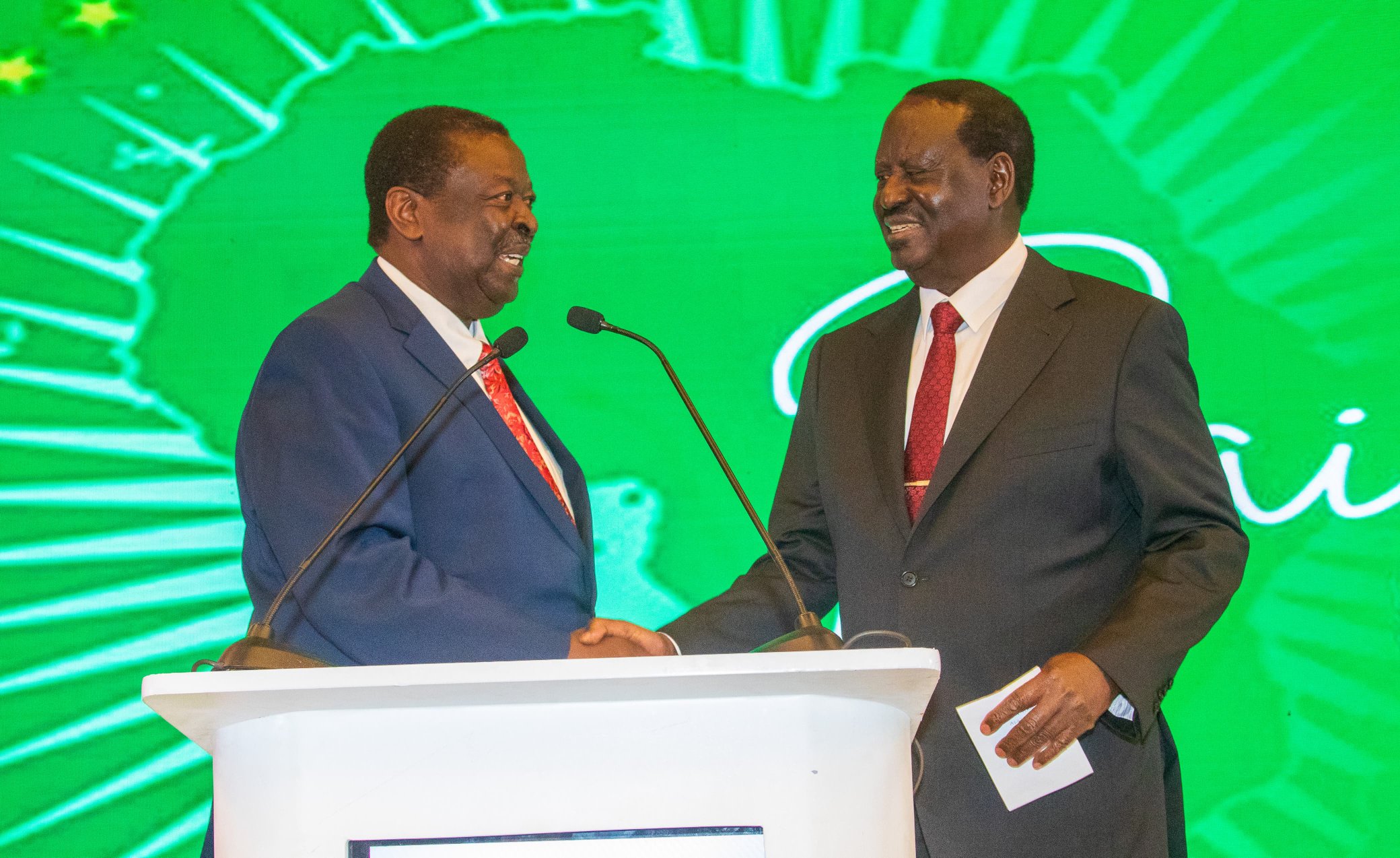
 Prime CS Musalia Mudavadi and ODM Leader Raila Odinga/FILE
Prime CS Musalia Mudavadi and ODM Leader Raila Odinga/FILE
Kenya's bid to secure the African Union Commission chairmanship through Raila Odinga ended in disappointment, marking yet another diplomatic setback for the country.
This outcome was not just a personal loss for Raila but a wake-up call for Kenya’s Ministry of Foreign Affairs. The defeat exposed fundamental weaknesses in Kenya’s diplomatic strategy and underscored the need for a more calculated, long-term approach to continental and global affairs.
While Raila was a formidable candidate with extensive experience in African politics, Kenya’s loss highlights critical diplomatic lessons that must shape future engagements.
If the MFA is to reposition Kenya as a continental powerhouse capable of winning such highstakes contests, it must recalibrate its strategy, abandon assumptions of automatic regional support, and refine its approach to quiet diplomacy.
Kenya has long played a pivotal role in African affairs, providing leadership in peace mediation, regional integration, and economic diplomacy.
Additionally, Kenyan diplomats have represented Africa with skill, tact, and strategic foresight in international platforms such as the United Nations.
However, the loss in the AUC chairmanship contest revealed cracks in Kenya’s diplomatic machinery. One glaring issue is the gradual decline of the Ministry of Foreign Affairs.
Over the years, political appointments of individuals lacking the necessary diplomatic skills and experience have weakened Kenya’s foreign policy execution.
Many ambassadors to key diplomatic stations lack the finesse required to navigate the complex world of international relations.
For instance, some high-ranking officials within the MFA, including principal secretaries, may possess eloquence but lack the credentials and strategic acumen required to manage such a consequential ministry.
The over-reliance on political loyalty rather than meritocracy has compromised Kenya’s diplomatic edge, leading to underwhelming performances in high-stakes international contests such as the AUC chairmanship.
One key takeaway from this loss is the urgent need to uphold professionalism and meritocracy in the MFA. The ministry must function as a professional entity driven by expertise rather than political patronage.
Kenya must reinstate the tradition of grooming career diplomats who possess a deep understanding of statecraft, international negotiations, and strategic diplomacy. Without this, Kenya risks further diminishing its influence on both continental and global stages.
Another significant observation is the growing importance of intelligence in diplomatic engagements. The National Intelligence Service played an instrumental role in securing Kenya’s interests during this campaign, marking a shift towards intelligence-led diplomacy.
Unlike previous instances where diplomatic affairs were left solely to the MFA, the active involvement of Kenya’s intelligence apparatus demonstrated an understanding that intelligence is a fundamental pillar of diplomacy.
This approach aligns with global best practices. The United States, for instance, has distinct intelligence agencies handling both domestic and international intelligence, ensuring that foreign policy decisions are informed by accurate data and analysis.
Given the concerns surrounding the MFA’s operations, it is plausible to suggest that the votes Raila secured were primarily a result of intelligence-led diplomacy rather than foreign policy acumen.
The MFA must recognise that such high-stake regional elections are not won on the strength of a candidate’s profile alone; influence matters more than individual prestige.
The winning candidate was likely backed by a well-coordinated and longterm diplomatic charm offensive, ensuring loyalty from key regional blocs.
Kenya’s campaign was highly visible, with President William Ruto making public declarations of support and lobbying extensively.
However, African diplomacy thrives on quiet negotiations rather than high-profile endorsements. Many of the key deals that determine AU elections happen behind closed doors, in discreet meetings, and through strategic economic or security promises.
Countries like Algeria, Egypt, and Nigeria—the continent’s major diplomatic players—operate with subtlety, preferring behind-the-scenes deal-making to loud public campaigns.
The MFA should invest in highlevel backroom diplomacy rather than relying on public rallies and overt endorsements, which may alienate undecided nations. To win future AU elections, Kenya must build long-term influence and credibility across Africa rather than seeking last-minute endorsements.
In conclusion, Kenya’s loss in the AUC chairmanship race should not be seen as a mere electoral setback but as a pivotal moment for self-reflection.
It underscores the need for a fundamental shift in Kenya’s diplomatic approach—from reactive lobbying to proactive, long-term engagement.
The Ministry of Foreign Affairs must internalise these lessons and reposition Kenya’s foreign policy for future leadership opportunities. Winning in African diplomacy requires patience, strategic alliance building, economic influence, and silent yet effective negotiations.
If Kenya is to succeed on the continental stage, it must embrace the reality that diplomacy is not about who speaks the loudest but about who moves the smartest.
Otieno Panya - Lecturer at Jomo Kenyatta
University of Agriculture and
Technology and writer focused on
global business trends and policies
[email protected]


